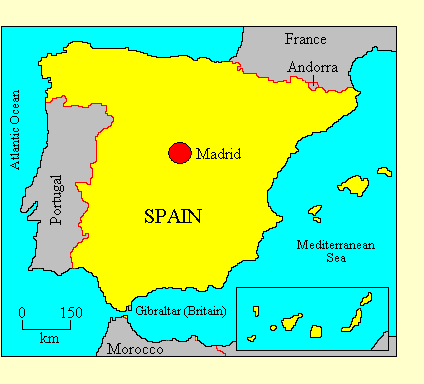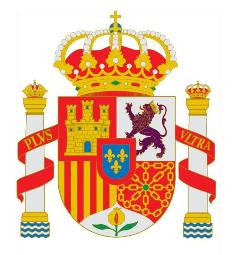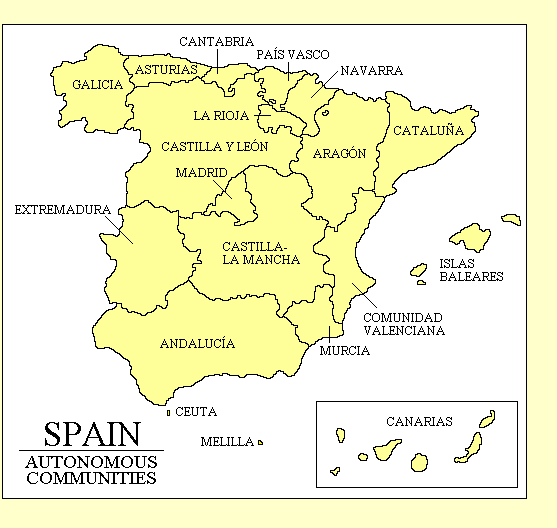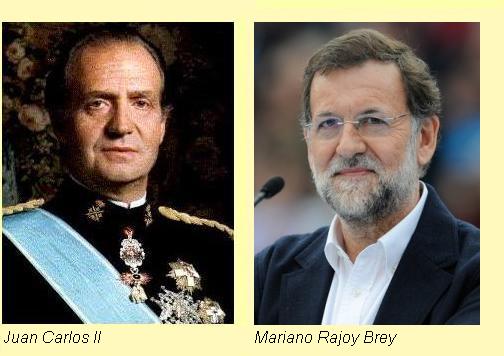

SPAIN
• Official name: Espana (Spain)
• Location: Western Europe
• International organisations: Council of Europe, European Union, North Atlantic Treaty
Organisation, Organisation for Economic Co-operation and Development, Organisation for Security and
Co-operation in Europe, United Nations, Western European Union, World Trade Organisation.
• Borders: Andorra, France, Gibraltar (British territory), Morocco, Portugal
• Coastline: North Atlantic Ocean, Mediterranean Sea
• Land area: 504,782 Km2
• Population: 46,700,000
• Annual GDP (PPP) per capita: US$33,700 (2009 CIA estimate). World ranking: 27
• Ethnicity: The population is almost entirely of Spanish or closely related stock such as Catalans. There is a 5% minority of Basques in the north-east.
• Languages: Castilian Spanish is the official language, but is the first language of only 74% of the population. Catalan, spoken by 17%, has official status in Catalonia, as do Galician (7%) in Galicia and Basque (2%) in the Basque Lands.
• Religion: Over 90% are at least nominally Catholic Christians, although religious practice has declined radically since 1975. There are small Jewish and Moslem minorities.
• Form of government: Constitutional monarchy and federal parliamentary democracy. Spain is divided into 17 Autonomous Communities, which have elected assemblies and substantial autonomy, and two Autonomous Cities (Ceuta and Melilla on the north African coast).

• Capital: Madrid
• Constitution: The Spanish Constitution came into
effect on 29 December 1978.
• Head of state: King Juan Carlos I assumed the throne on 22 November 1975.
• Head of government: The Prime Minister is appointed by the King, and is the leader of the largest party in the lower house of the legislature, to which he is accountable.
• Legislature: Spain has a bicameral legislature. The Congress of Deputies (Congreso de los Diputados) has 350 members, elected for four-year terms by proportional representation from each Autonomous Community.
The Senate (Senado) has 248 members, of whom 208 are elected for four-year terms in four-member constituencies and 40 are appointed by the legislatures of the Autonomous Communities.
• Electoral authority: The Ministry of the Interior conducts national elections.
• Freedom House 2011 rating: Political Rights 1, Civil Liberties 1
• Transparency International Corruption Index: 61% (30 of 178 countries rated)
• Reporters Without Borders Press Freedom 2010 Index: 87.7% (39 of 178 countries rated)
• Heritage Foundation Economic Freedom 2010 Index: 70.2% (31 of 179 countries rated)
Political history
The Kingdom of Spain was formed by the union of Castille and Aragon at the end of the 15th century. The conquest of the Americas made Spain a world power, but after 1700, when the throne passed to the House of Bourbon, its power declined steadily. Spain's decline culminated in the loss of its last major colonies in the Spanish-American war of 1898.
This defeat led to the development of a movement for political reform, culminating in the proclamation of a Republic in 1931. Democratic elections were held for the first time, with universal male suffrage. The conservatives never accepted the Republic, and the election of a left-wing Popular Front government in 1936 was the pretext for a military revolt led by General Francisco Franco. The failure of the rebels to secure a quick victory led to a bitter three-year civil war.
Franco's forces completed their victory in March 1939, and Franco established a semi-fascist regime.
The monarchy was officially restored, but Franco remained as head of state until his death in 1975, when the
monarchy was restored.

King Juan Carlos dismantled the aparatus of Francoism, all political parties were legalised, and free elections were held. Spain has made a rapid transition to a stable, prosperous, increasingly secular democracy. The Basque and Catalan regions were given substantial economy. In 1982 Spain elected a socialist government, ending the political schism dating back to the Civil War.
The conservative People's Party (PP) was in office from
1996 until 2004. The People's Party has its roots in the Franco-era rightwing, but has fully accepted democracy.
Similarly, the Spanish Socialist Workers' Party (PSOE),
in office from 1982 to 1996 and since 2004, has abandoned both socialism and republicanism and is a
mainstream social democratic party. The once powerful Communist Party (PCE) is declining, even in the disguise of
the United Left (IU).
Despite the adoption of a federal system, the non-Castilian regions of Spain still support autonomist
parties such as the Convergence and Union (CiU)
(a moderate Catalan nationalist party), the Basque Nationalist Party (EAJ-PNV), the Galician Nacionalist Bloc and the
Canary Islands Coalition (CC).
The long-serving PSOE government of Felipe Gonzalez was defeated in 1996 by Jose Maria Aznar, who formed a PP
government with the support of the CiU. After eight years in opposition the PSOE returned to office in 2004 under
Jose Luis Rodriguez Zapatero, who was comfortably re-elected in 2008. The election continued the trend of the two major
parties increasing their support at the expense of minor parties. In 2010 Spain became embroiled in the European debt
crisis, and the popularity of the PSOE government plunged. At elections in November 2011, the PSOE was heavily defeated,
losing votes to both the PP and the left. The PP's Mariano Rajoy
formed a PP majority government.
Updated January 2012
|


